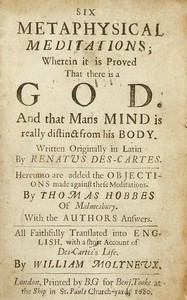Six metaphysical meditations: $b Wherein it is proved that there is a God and that mans mind is really distinct from his body
Author: René Descartes
Bookshelves: Philosophy & Ethics, Religion/Spirituality/Paranormal

Summary
"Six Metaphysical Meditations" by René Descartes is a philosophical treatise written in the 17th century. This work delves into the nature of existence, knowledge, and the distinction between mind and body, ultimately aiming to prove the existence of God and to establish a firm foundation for scientific inquiry. The meditations present a rationalistic approach to metaphysics, addressing profound questions that have troubled philosophers for centuries. The opening of "Six Metaphysical Meditations" introduces Descartes's intention to dismantle his previous beliefs in order to establish a foundation for true knowledge. He reflects on the fallibility of human senses, questioning everything he had once viewed as true. This leads him to the realization of his own existence as a "thinking thing," laying the groundwork for the arguments he will present about the nature of the mind, the existence of God, and the essential distinction between mental and physical substances. As he moves through his meditations, he emphasizes the importance of clear and distinct perceptions in acquiring knowledge, ultimately leading to his profound conclusion about the certainty of his own existence and the necessity of a divine creator. (This is an automatically generated summary.)
 LibraryManager
LibraryManager